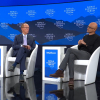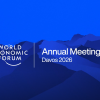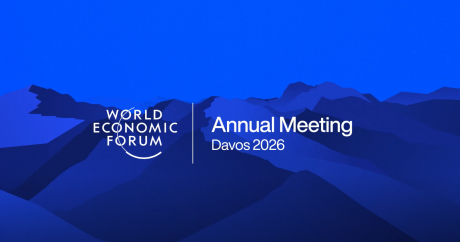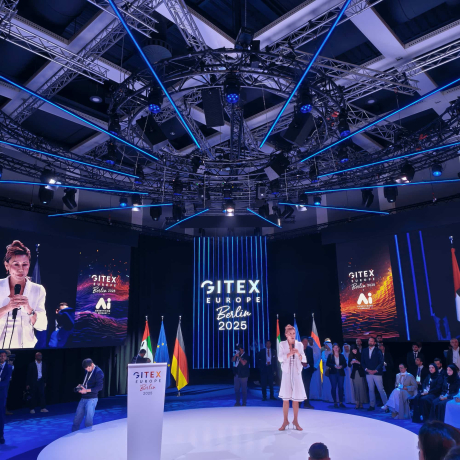The European Economic Congress (EEC) is one of the largest business conferences in Central Europe, held annually in Katowice, Poland. This year, it took place from April 23-25, 2025, marking its 17th edition and reinforcing the event's reputation as a major platform for discussions on economic trends, global challenges, and development. The mission of the European Economic Congress is to jointly create a broad forum for open debate on the European economy and the future of Europe, and Poland, gathering different business leaders, politicians, and experts.
The European Economic Congress (EEC) in Katowice, Poland once again set a new record in attendance and scale. The event attracted an impressive 18,000 participants, including 13,500 attending in person, and featured 1,300 distinguished speakers. With over 200 panels offering a precise analysis of today’s reality, the Congress also hosted numerous accompanying events, including the EEC Startup Challenge.
Representatives of international corporations, large and medium-sized businesses, state-owned companies, decision-makers and administration, EU and non-governmental institutions, science and media jointly sought answers to the question of how to effectively conduct economic policy in the reality of development challenges, global instability and geopolitical tensions. The discussions clearly confirmed that Europe today faces the need to strengthen broadly understood security: competitiveness and independence, defense capabilities and energy and technological sovereignty.

The slogan of this year's European Economic Congress (EEC) was Together for a Safer Future, which embodies the spirit of collective thinking that shaped the event. Discussions at the EEC explored key topics, including energy security, ensuring reliable and stable energy supplies, and strengthening industrial and production capabilities within Europe. The Congress also addressed a broad range of crucial issues, such as the future of Europe and the world, economic and energy security, green energy, international economic cooperation, artificial intelligence, investments, finance, legal regulations, and both green and energy transformation. Additionally, participants delved into matters of digitalisation, disinformation, new technologies, innovations, the property market, deregulation, education, global trade, Ukraine, EU budget priorities, migration policy, development, economic disparities between rich and poor countries, and art.
Key Takeaways from the 17th European Economic Congress
Deregulation
- Driving investments through streamlined regulations: Cutting bureaucratic barriers and simplifying regulatory processes to create a faster, more efficient route for businesses
To drive deregulation and foster economic growth, Lukas Savickas, the Minister of Economy and Innovation in Lithuania emphasized that the Lithuanian government will approach the energy transition with a helicopter view, focusing on facilitating investment processes. In line with this approach, the plan also seeks to reduce administrative hurdles and improve the overall regulatory environment by streamlining regulations. The goal is to significantly shorten the timeframe between an investment decision and project completion, cutting it by tenfold. Bureaucracy and administrative burdens should be minimized as much as possible at both the European and national levels. The Lithuanian government aims to fast-track investments by drastically reducing bureaucratic delays and simplifying procedures to develop a frictionless investment environment and ensure businesses can navigate regulatory processes as smoothly as possible. Magdalena Sobkowiak-Czarnecka, Undersecretary of State, European Union Affairs Division, Chancellery of the Prime Minister, stated that it is the first time the issue of deregulation has been raised at the highest level so there is an agreement referring to deregulation. The slogan of simplification and cutting the red tape is a must have of each speech, but what has changed is the approach to deregulation. The simplification of regulations is going to be executed not by their authors, but by a special working group which points out the regulations necessary to be simplified. One of the first successes is the initiative Stop the Clock which is about stopping the obligation of reporting at least for a year depending on the size of the business.
Tomasz Domogała, president of TDJ, during the session "Europe's Competitive Economy", vividly pointed to the structural inequalities that the Union is facing in the global economic race, appealing for urgent deregulation, cheaper energy and access to capital.
- If what is happening in the global economy were compared to a volleyball match, it would turn out that our competition plays with six players, and we with three, can take doping, and our public procurement law does not allow us to cheer on Poles. The economy of Europe is not in agony. The Union reflected at the last moment. The report by the former head of the European Central Bank Mario Draghi, published in September 2024, gave a lot to think about. In January this year, the European Commission presented a competitiveness compass based on the conclusions drawn from it. However, words need to be quickly turned into specific solutions stimulating the European economy. Europe needs an effect of scale. We need to take the next step - he said.
According to the entrepreneur, Europe should reduce energy costs, make labor law more flexible, deregulate significantly, and facilitate access to capital. During the EEC, there were also voices that Europe must develop a new economic development strategy to compete with China and the United States.
Important voices were also raised during the debate commenting on the results of the report "Polish Growth Engines. Business Concerns and Postulates" prepared especially for the Congress. Krzysztof Pawiński, President of the Maspex Group, referring to EU regulations concerning, among others, carbon footprint reporting, emphasized: - The fact that we will have to report more will not make our business better. This cannot be decreed - he explained. Additionally, in his opinion, postponing the moment when the reporting obligation will cover a wide range of companies is not of great importance, because the costs that will be postponed now will have to be incurred in the future anyway. Moreover, Zbigniew Jakubas, owner of the Multico group and Motor Lublin, said during the "Investments and Development" session that there are trillions of zlotys in the bank accounts of entrepreneurs, but companies are afraid to spend them because we have overregulated regulations and excessive bureaucracy.
Energy Transformation
- Strengthening economic security through energy independence: Investing in green energy sources—such as nuclear, wind, solar, and both onshore and offshore renewables
Both Europe and the world, including Poland, are moving towards implementing a plan to phase out fossil fuels, especially coal, by investing in renewable energy sources, as Marzena Czarnecka, Minister of Industry stated. Nuclear energy is both an opportunity and a necessity, which is why Poland intends to launch a nuclear power plant in 2036. According to Ireneusz Fąfara, the President of the Management Board and CEO of ORLEN SA, the company’s strategy prioritizes energy security through investments in offshore wind farms and hydrocarbon power plants and infrastructure.
Lord Hunt of Kings Heath OBE, Minister of State at the Department of Energy Security and Net Zero, stated that clean energy is extremely important to the United Kingdom as it gives energy security and independence from the international fossil fuels market. The UK is planning to achieve climate neutrality by 2030, transitioning from 30% of green energy usage to 95% by using wind energy, solar energy, onshore and offshore energy. Moreover, the UK intends to prioritize nuclear power by investing in small modular reactors. Similarly, Lukas Savickas, the Minister of Economy and Innovation in Lithuania, views energy challenges as opportunities, leading the government to plan for meeting 100% of its energy needs through green sources by 2030.
Disinformation
- Combating disinformation requires a multi-pronged strategy: Addressing the scale, dynamics, and impact of disinformation through strategic regulation, media literacy, fact-checking initiatives, and technological investments
Disinformation serves as a tool of systemic cyberaggression and hybrid warfare, with perpetrators leveraging various methods, technologies, and platforms to achieve specific objectives. It can disrupt democratic and electoral processes worldwide, posing significant risks to democracy and social trust. In a fast-paced news environment where journalists compete to report first, TVN Warner Bros. Discovery, according to Jan Mróz, Vice President of Communication & Public Affairs, invests in technology that enhances fact-checking and source verification.
According to Jakub Olek, the Director of Government Relations and Public Policy at TikTok for Central & Eastern Europe, the company takes a systematic approach to addressing disinformation, guided by a strategy built on three pillars. The first pillar involves banning the advertising of political content, with advertising options for political accounts automatically disabled. Relevant political TikTok accounts are classified as Government, Politician, and Political Party Accounts (GPPPA), with a number of policies applied to them. The second pillar focuses on collaboration with partners, including government and fact-checking organizations. The third pillar emphasizes user education through initiatives such as educational campaigns, media literacy programs, and political content linked to reliable sources. According to Jakub Olek, the fight against disinformation is an ongoing battle with no end in sight. To ensure the platform's safety, the company invests $2 billion annually.
Artificial Intelligence
- Driving a paradigm shift, AI is revolutionizing decision-making by transitioning from a supportive tool to an autonomous system operating under human supervision: Enhancing efficiency, unlocking innovation, and reshaping industries for the future.
Artificial intelligence is reshaping the business landscape, redefining competition and efficiency. As companies integrate AI into their operations, questions arise about how to use it consciously, effectively, and safely—balancing its potential with its risks. The AI Act, the first comprehensive legal framework for AI systems and models, aims to establish regulations that guide its responsible implementation. With gradual enforcement, the Act introduces obligations for employers, promising enhanced security and innovation. However, concerns remain about whether these regulations will foster technological advancement or impose excessive restrictions that hinder progress.
Mike Skowron, AI GTM Lead, CEE at Google, who believes AI does not only bring gradual, incremental improvements but will also spark transformative, revolutionary change, said “This is a breakthrough moment of paradigm shift when technology allows us to think about making that frog leap and it can be done faster using new technologies.” Additionally, he is a fan of experimentation culture which is based on the premise “We are going to fail, so within the organization we must have a culture that doesn't stigmatize anyone because of making a mistake. If you're going to make a mistake, make it quickly.” He strongly believes AI will bring value so we should embrace failure by creating a no-blame culture where mistakes are seen as learning opportunities, and if errors occur, they should happen quickly so we can learn fast. Brilliantly summarizing the issue, Mikolaj Wezdecki, Vice-President of the Management Board of LPP.SA, stated, "Failing fast is cheaper than failing slowly!" His remark later became the headline for a compelling article written by Mike Skowron under the same title.
Anna Korc, CEO of Digital Techies and a specialist in 3D AI, highlighted the importance of being up to date with AI, referencing Fei-Fei Li from Stanford University, who secured $230 million for her startup. Furthermore, she believes that “3D AI technology, which allows us to analyze the world around us and draw conclusions from it, is the next big thing”, creating enormous opportunities for its commercial and military usage.
Global Market
- Navigating geopolitical tensions and shifting trade policies, businesses face increasing uncertainty: Investment strategies, market valuations, and supply chain structures are constantly being reshaped in a highly volatile market.
At the EEC, the topic of the new global economic landscape, which has been reshaped by growing political and financial rivalry among major powers, was raised many times. A noticeable shift away from globalization toward protectionism has emerged, with the U.S.-imposed tariffs triggering a trade war that has disrupted business operations and worsened conditions for many companies. In this increasingly competitive environment, Europe must carefully navigate its position, as the assertive trade policies of the new U.S. administration challenge the EU’s economic stability and strategic assets. To preserve its independence and enhance competitiveness, the EU must develop mechanisms that foster resilience while continuing to benefit from trade and international collaboration.
Former Ambassador Mark Brzeziński highlighted Poland's resilience, safety, and prosperity despite its proximity to conflict zones, simultaneously acknowledging the challenges. He praised the mobilization of Polish citizens and businesses, which have built a thriving market economy near regions affected by war. Additionally, the former Ambassador believes that it is possible to do more in terms of “the understanding abroad of the innovative and attractive entrepreneurial ecosystem that is Poland in 2025”.
During the panel titled “The Global Market Anew” which covered the topic of geopolitical uncertainty and shifting trade policies, the global investment landscape was discussed, highlighting the impact of U.S. tariffs under President Trump’s administration. The repercussions of these tariffs extend beyond immediate price hikes, fundamentally altering corporate valuations and investment behavior. While American corporations once thrived on stability and predictable regulatory frameworks, recent trade tensions have triggered capital reallocation to more politically stable regions, such as Europe and Asia. This shift has not only affected stock markets—reducing price-to-earnings ratios of major firms—but has also slowed merger and acquisition (M&A) activity, stated Weronika Achramowicz, a managing partner at Baker McKenzie, during the Global Renewal Market panel. She highlighted that the uncertainty surrounding tariffs and trade policies has made it difficult to assess company valuations, leading to hesitation in deal-making. She also noted that while public transactions have slowed significantly. Investors and private equity firms, wary of the volatile policy landscape, are seeking alternative opportunities that offer greater security in the evolving global economy.
Beyond tariffs, the panel also explored critical supply chain vulnerabilities and the strategic importance of resource security. With increasing emphasis on rare earth minerals and other essential raw materials, governments and industries face the challenge of ensuring long-term access to vital resources. Panelists urged proactive measures, including fostering innovation to reduce dependency on volatile trade agreements. Additionally, discussions pointed to Europe’s potential to strengthen its global market presence through refined strategies in diplomacy, industry branding, and resource management. While uncertainty dominates the current economic climate, structured and forward-thinking policies could pave the way for future stability and growth.
International Collaboration
- Strengthening strategic collaboration is key to Poland’s economic growth and security: By deepening partnerships with the United States, United Arab Emirates, Saudi Arabia, Germany, Switzerland, Czech Republic, Slovakia, and Taiwan Poland enhances economic security, competitiveness and fosters innovation.
Poland’s economic security relies on stability, modern technologies, and resilient infrastructure, with American investors playing a crucial role in shaping its economy. Transatlantic cooperation presents a strategic opportunity to counterbalance China’s growing global influence, reinforcing Poland’s position within international markets. Poland’s partnerships with the United Arab Emirates, Germany, Switzerland, and Saudi Arabia focus on trade, investment, and technological innovation, fostering economic growth and diversification.
At the regional level, collaboration with Central European nations—Czech Republic and Slovakia—strengthens competitiveness and advances joint efforts in Ukraine’s reconstruction, balancing cooperation and rivalry in a shifting geopolitical landscape. Economic resilience is further enhanced through strategic investments in key industries such as energy, green technology, and infrastructure, supporting long-term sustainability.
Beyond Europe, Poland is expanding its presence in Asian markets, including Korea, Vietnam, and Thailand, capitalizing on their rapidly growing middle class, technological progress, and urbanization. These markets offer promising export opportunities, yet challenges such as cultural differences, regulatory complexities, consumer behavior, and language barriers require adaptability, local support, and market-specific knowledge for successful expansion.
This multifaceted approach to economic collaboration enables Poland to reinforce its security, drive innovation, and maintain a competitive edge in an evolving global economy.
Art in Business
- Integrating art with business is making companies change their corporate culture: Art fosters creativity in the workplace, sparking lively discussions and strengthening connections
During the panel “Art, Culture, Business”, there was a discussion which concerned the evolving relationship between art and business in Poland. The main raised question was whether art in Poland plays any role in business. Historically, Polish entrepreneurs have not prioritized art, but there are signs of change as some businesses begin to recognize its value. It was highlighted how corporate art collections can enhance a company’s prestige, build trust, and contribute to long-term stability. Very compelling conclusion was made that art influences workplace culture, making environments more engaging for employees, fostering creativity and increasing productivity. Additionally, incorporating art into business settings can improve client experiences, create networking opportunities, and encourage meaningful conversations. While this shift is still in its early stages, there is optimism that in the future, art will play a more significant role in Polish business.
At a societal level, the growing appreciation for art mirrors broader cultural development, as Poland gradually embraces the concept of meaningful art collecting. The distinction between simply accumulating works and curating thoughtful collections will help shape an enduring artistic legacy. Encouraging open discussions about art—its relevance, impact, and social significance—is essential before widespread collecting can take root. As art organically permeates different aspects of business and daily life, it has the potential to transform corporate and social landscapes. Though this process will take time, fostering awareness and education ensures that the integration of art into Polish business will be lasting and deeply embedded in the country’s identity.
Although business people are still learning to appreciate art, young professionals are increasingly drawn to workplaces that integrate art in a meaningful way. Environments enriched with artistic expression foster creativity, reflect strong values, and promote a sense of responsibility, making them more attractive for long-term engagement. These workplaces not only inspire innovation but also create a deeper emotional connection, encouraging employees to stay. As Piotr Krupa, president of the management board at Kruk SA and great art collector, stated “Young generations are looking for places with art with a soul. Where there is art, there are values, aesthetics, responsibility and that is where they want to stay and work.”
Conclusion
The XVII European Economic Congress has highlighted the need for Europe to strengthen its competitive position in the global economy. Persistent challenges such as regulatory burdens, demographic shifts, and geopolitical uncertainties demand bold reforms and strategic investments. By fostering innovation, streamlining regulations, and enhancing digital and green transitions, Europe can secure long-term economic resilience. The discussions at the Congress reaffirm that collaboration between policymakers, businesses, and institutions is essential to maintaining Europe's leadership in key industries. As the continent navigates an evolving economic landscape, decisive action will be the key to sustaining growth and prosperity. The Congress has reinforced the importance of forward-thinking leadership in ensuring Europe remains a dynamic and influential player on the world stage.






Comments